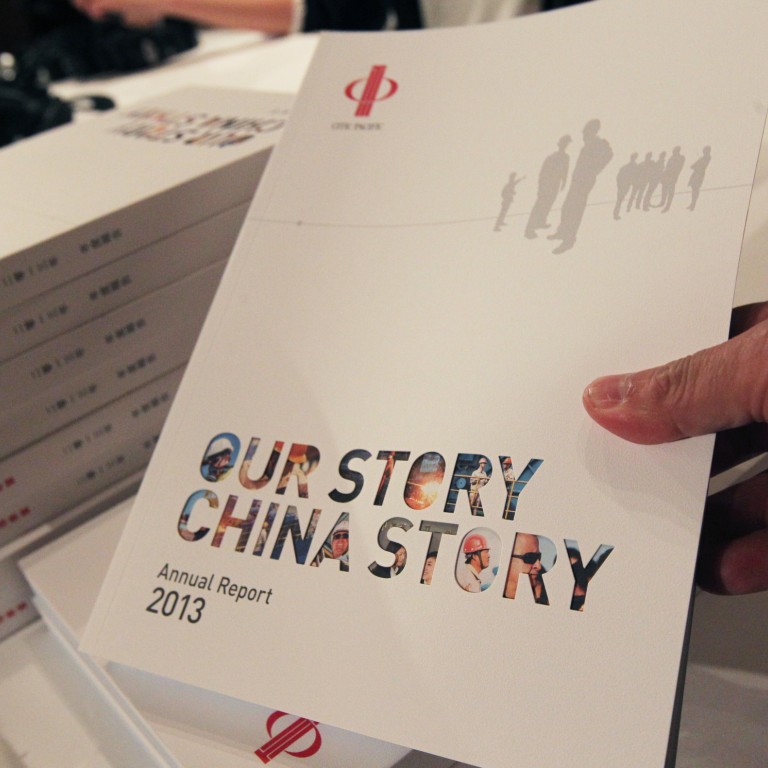
Citic Pacific's acquisition of Citic Group is merely state sleight of hand
It is billed as a pioneering move to promote reform and make a square appear to be round, but the reality is that the square remains a square
The mainland's new round of state-owned enterprise reform has brought much excitement. Yet, if Citic Pacific's acquisition of its parent Citic Group is indeed the "pioneer" it has billed itself as, the reform doesn't look very encouraging.
What one sees is a sleight of hand to make a square look round. But a square remains a square.
The task is to get the Citic Group a full listing - a symbolic piece of the new leader's pledge for reform.
The problem is Beijing insists that all state assets cannot be sold below its book value. That makes a public offering very difficult if not out of the way.
The task is to get the Citic Group a full listing – a symbolic piece of the pledge for reform
This is because Citic Bank, which forms a significant chunk of Citic Group, is trading below its book value. Who will pay at book value for an IPO of Citic Group?
An asset injection into Citic Pacific is the only option. The risk is minority shareholders may say no to the injection but they don't really have a choice.
Thanks to a 2007 decision to sink a fortune into an Australian iron-ore deposit to enhance the country's supply security, Citic Pacific is in dire financial straits. With iron-ore prices falling further and a money pit in sight, shareholders can easily accept the asset injection as a lifeboat.
However, given its leverage, Citic Pacific cannot possibly pay with cash. It has to be a share plus cash payment. The problem is Citic Pacific was trading lower.
Citic Group cannot accept Citic Pacific shares at its market price or it will have way too many shares and breach the listing rules. The only way to do it is to price Citic Pacific shares at a significant premium to its trading price.
Despite that, the asset injection still cut the public float from 42.5 per cent to 6.23 per cent. Therefore, a share placement is needed to bring up the public float to 15 per cent and to raise the cash to pay for the asset.
That leads to the second problem.
Who will buy non-controlling stakes at a premium to its trading price?
Only two would. The first is those who work on orders, don't really have a choice, or not care so much about profit. That isn't too difficult to find in China.
Eight state authorities and firms are to churn out HK$39.8 billion to take over 80.5 per cent of Citic's share placement.
Among them are the National Social Security Fund, the investment arm of the State Administration of Foreign Exchange and four top state-owned banks.
The second is those who are ready to suffer a short-term loss for a long-term return. To Citic Group, which has a place in almost every sector of the country's financial industry, those friends are not too difficult to find either.
Seven foreign sovereignty funds, insurers and banks are to foot the remaining 18.5 per cent placement bill. Most are looking to Citic Group for entry into the mainland market.
Among them is Qatar Holding, which signed a strategic alliance deal with Citic Group side by side to its US$200 million share subscription. There is also Taiwan-based China Trust Bank, whose parent is about to sell 5 per cent to the Citic Group, according to Taipei media.
Meanwhile, Temasek Holding - which has profited significantly from the listing of mainland banks including China Construction Bank of which Citic chairman Chang Zhenming was a former governor - will chip in US$100 million. That's the smallest investment the Singaporean sovereign fund has ever made in any SOE fund raising.
The result of all these artificial manoeuvres is the change of Citic Pacific - the SOE with the smallest state control of only 57.6 per cent - into the so-called new Citic where the holding of the state and SOEs will amount to 92 per cent.
Together with the foreign financial institutions, which are unlikely to be too vocal at the expense of their long-term co-operation with Citic Group, the holdings of independent investors will shrink into a total of 7.95 per cent.
Now what will you say about the much-publicised SOE reform, sale down of state shares and introduction of the "mixed ownership" model? One small step in a very long journey?
No wonder when asked Chairman Chang how will the deal lead to ground-breaking change in an SOE in an early press conference, the veteran SOE manager was rather coy.
He would only repeat two things. One, this will be the first ever listing of an SOE in full instead of only one or two of its subsidiaries.
Two, Citic Group will become a Hong Kong-registered and headquartered SOE.
Perhaps, these are what really matters to any state asset manager. If the proposal is approved, each and every share of the Citic Group will become transferable while the state stake of its H-share peers cannot.
Plus, with the flexibility offered by the Hong Kong regulatory regime instead of the choking control at home; and a significant drop in minority control, any manager will be grinning. How that flexibility is going to translate into shareholders' benefit is another story.

